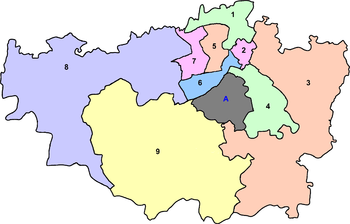Heera Mandi
Heera Mandi (Punjabi: ہیرا منڈی) meaning "Diamond Market", also known as Shahi Mohalla (meaning: The Royal Neighbourhood) is a red-light district and a bazaar in Taxali Gate, Lahore (Punjab), Pakistan. The market was originally the center of the city's tawaif culture in the Mughal era. However, under the British colonial period it became a hub of prostitution. Within the market, women and khusras' (transsexuals) offer traditional and classical dances. From the British colonial period till today, it remained a centre of prostitution in Lahore under the veil of dances, such as mujra, a branch of classical South-Asian sensual dancing.[1] Many Hijras frequent the area and are involved in this dance culture.
During the day the place is much like other Pakistani bazaars and is known for its good food, wide range of Khussa (traditional Mughal footwear) and shops for musical instruments. The place is also considered as a sign for the city of Lahore and sometimes the words 'heera mandi' themselves are considered to be offensive in formal talks.
History
Name
Heera means diamond mandi in Urdu and was supposedly used by locals to describe the beauty of the girls in the market. The people called the courtesans "heeras" or diamonds. The name eventually stuck and the market was traditionally called Heera Mandi. The back side of shahi mohallas has so narrow alleyways that even cycles or motor bikes cannot enter in many small streets.
Beginning of prostitution
The brothel houses were first developed by the British in old Anarkali Bazaar for the recreation of the British soldiers during the British Raj. After that these were shifted to Lohari Gate and then to Taxali gate. They seemed to have spent more time at Taxali Gate than other places. They settled in Heera Mandi, and traces can still be found.
In recent times the area has become known for prostitution and crime.[2]
See also
References
- ↑ Grimes, William (July 20, 2005). "In Shadows of a City of Pleasure, Courtesans Grow Old". The New York Times. Retrieved 25 April 2010.
- ↑ Zohaib Saleem Butt, "Heera Mandi: Scarlet secrets of Lahore", The Express Tribune, August 20, 2010
Further reading
- Saeed, Fouzia (2001). Taboo!: The Hidden Culture of a Red Light Area. Karachi: Oxford University Press. ISBN 0-19-579412-5.
- Saeed, Fouzia (2006). "Chapter 6: Good women, bad women: prostitution in Pakistan". In Gangoli, Geetanjali; Westmarland, Nicole. International Approaches to Prostitution: Law and policy in Europe and Asia. The Policy Press, University of Bristol. pp. 141–164. ISBN 1-86134-672-7.*Brown, Louise (2006). The Dancing Girls of Lahore: Selling Love and Saving Dreams in Pakistan's Pleasure District. Harper Perennial. ISBN 978-0-06-074043-6.
- Khan, Noor Mohammad (2009). Some Time On the Frontier-A Pakistan Journal. CreateSpace. ISBN 1-4404-1597-8.
